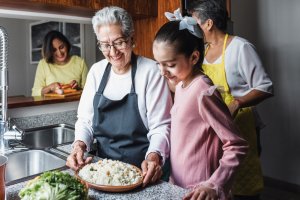Presented By: Poverty Solutions
Children Living in Grandparent-Led and Multigenerational Families: Implications for Policy and Practice
Webinar from Institute for Research on Poverty at U-W

Children Living in Grandparent-Led and Multigenerational Families: Implications for Policy and Practice (Webinar)
Wednesday, September 6, 2023, 2-3pm ET
Learn more and register: https://wisc.us20.list-manage.com/track/click?u=9843475efd2f7b3976fcd0fbe&id=c6bb8f45b3&e=31c34e2bd7
The number of children living in multigenerational households has increased steadily since the 1980s. As of 2021, more than 10% of children (roughly 7.5 million) share a home with two or more generations. While the stays may be relatively short, overall, about 30% of children in the United States will live in a multigenerational or skipped-generation household at some point during their childhood. This is even more common for children of color and for those whose adult family members are low income. In this webinar, panelists will examine the scope of the issue and its implications for child well-being and security, as well as opportunities for policy and practice to support these children and their adult household members
Presenters:
- Natasha Pilkauskas, Gerald R. Ford School of Public Policy; Poverty Solutions; University of Michigan
- J. Michael Collins, School of Human Ecology, University of Wisconsin–Madison
- LaShawnDa Pittman, Department of American Ethnic Studies, University of Washington
Wednesday, September 6, 2023, 2-3pm ET
Learn more and register: https://wisc.us20.list-manage.com/track/click?u=9843475efd2f7b3976fcd0fbe&id=c6bb8f45b3&e=31c34e2bd7
The number of children living in multigenerational households has increased steadily since the 1980s. As of 2021, more than 10% of children (roughly 7.5 million) share a home with two or more generations. While the stays may be relatively short, overall, about 30% of children in the United States will live in a multigenerational or skipped-generation household at some point during their childhood. This is even more common for children of color and for those whose adult family members are low income. In this webinar, panelists will examine the scope of the issue and its implications for child well-being and security, as well as opportunities for policy and practice to support these children and their adult household members
Presenters:
- Natasha Pilkauskas, Gerald R. Ford School of Public Policy; Poverty Solutions; University of Michigan
- J. Michael Collins, School of Human Ecology, University of Wisconsin–Madison
- LaShawnDa Pittman, Department of American Ethnic Studies, University of Washington